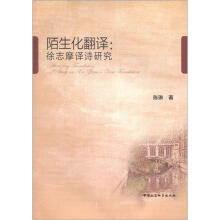Introduction
0.1 Significance of the Research into Xu as a Poet-cum-Translator
0.2 Review of the Research into Xu's Verse Translation
0.3 Objectives and Research Method
0.4 Composition and Construction
Chapter 1 Social, Cultural, and Personal Background
1.1 Social, Cultural, and Creative Writing Conditions for the Artistic Field in Modern China: Attempts at Westernization
1.2 Translation Agenda in Xu's Day
1.3 Biographical Evidence for Xu' s Disposition of Open Mindedness to the New
1.4 Xu's Verse Translation Practice and Thinking
1.4.1 Interest in Literary Uniqueness of the Source Text
1.4.2 Translation Ideal versus Formal Shift
1.4.3 Experiment with the Expressivity of Vernacular Chinese
1.5 Summary
Chapter 2 From Defamiliarization to Alienation Effect
2.1 Defamiliarization
2.1.1 Shklovsky's Definition
2.1.2 Nature of Defamiliarization
2.1.3 Insights into the Novelty of Poetic Language
2.2 Alienation Effect
2.2.1 Brecht's Definition
2.2.2 Differences between Defamiliarization and Alienation Effect
2.3 Subjective Artistic Nature of Literary Translation
2.4 Summary
Chapter 3 Alienizing Translation
3.1 Definition
3.1.1 Understanding of Defamiliarization in Translation Studies
3.1.2 Working Definition
3.2Procedures of Alienizing Translation regarding the Ontological Nature of Translation
3.2.1 Alienization Procedure
3.2.2 Hybridization Procedure
3.3 Summary
Chapter 4 Interness as the Philosophical Motivation for Alienizing Translation
4.1 Interness
4.1.1 Interness as the Result of Intersubjectivity
4.1.2 Interness as the Recognition of Cultural Respect and Complement in Translating
4.2 Interidentity of a Poet-cum-translator
4.3 Translational Intersubjectivity between Xu and His Translated Poets
4.4 Inter-textual Reference as a Semiotic Construct
……
Chapter 5 Alienizing Translation in Relation to the Manipulation of Translation Norms
Conclusion
Appendix Xu Zhimo's Verse Translation
References
Afterword

 缺书网
缺书网 扫码进群
扫码进群





